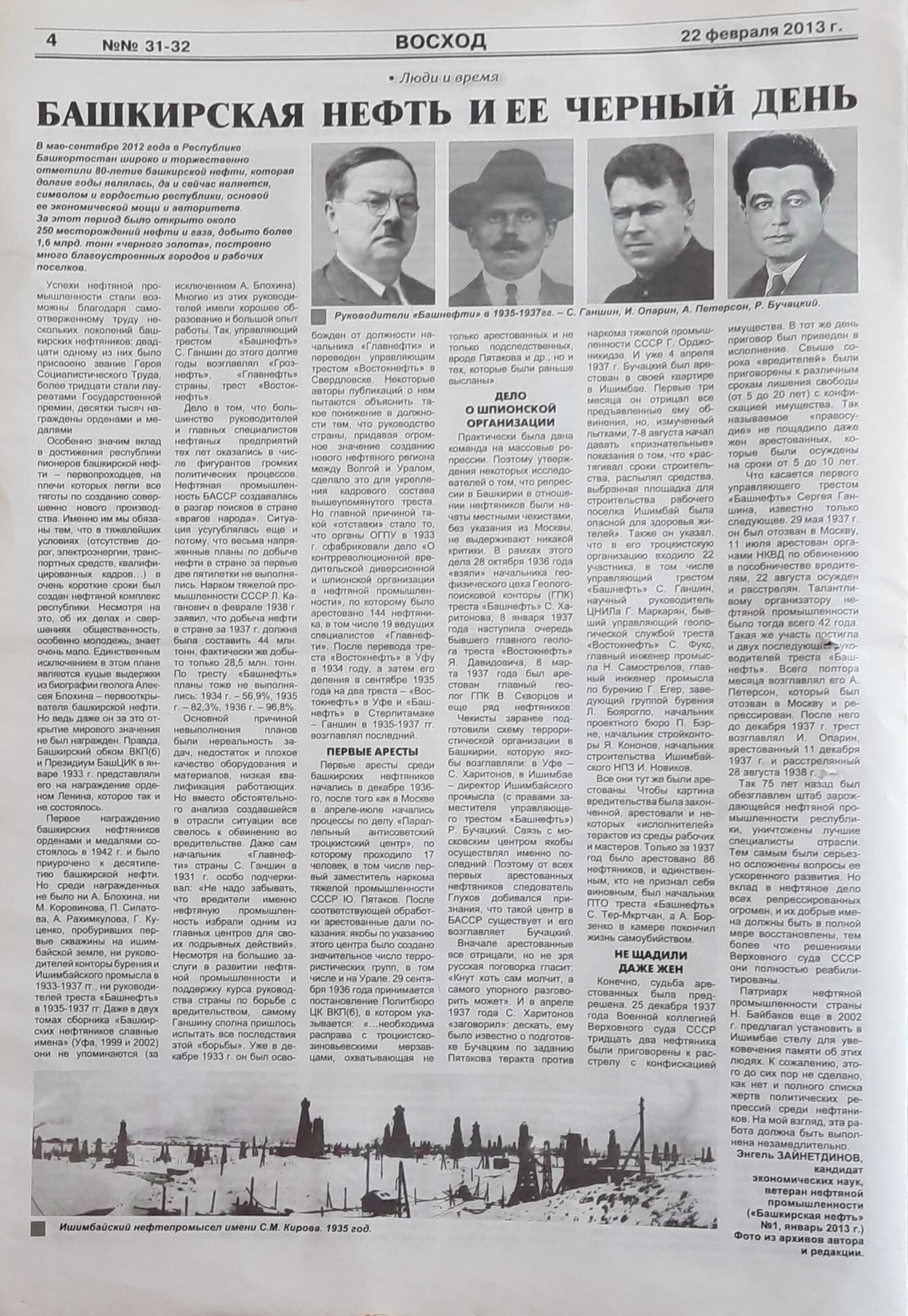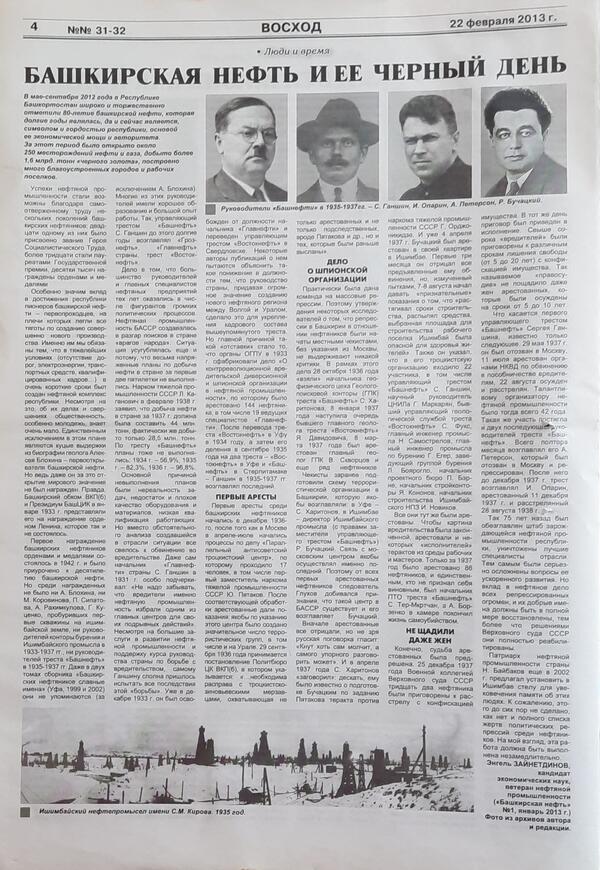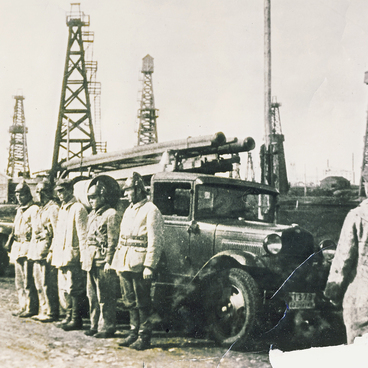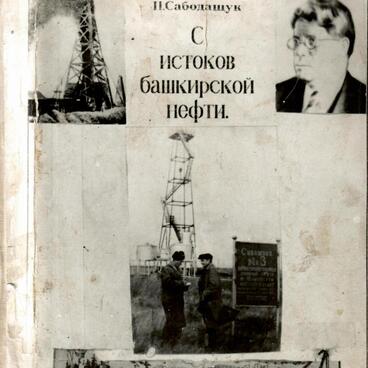One of the exhibits displayed in the Ishimbay Museum of History and Local Lore is a clipping from the local newspaper ‘Voskhod’ (literally: Sunrise) dated February 23, 2013. Titled ‘Bashkir Oil And Its Darkest Day’, this article was written by a scientist, oilman, and journalist Engel ZainetdInov. In it, he told the dramatic story of the first directors of the Bashneft trust company, which was founded on September 1, 1935.
In his article, Zainetdinov emphasizes the importance of the great contribution of Bashkir oil pioneers to the region’s development: it was they who, despite a variety of obstacles, managed to launch new production operations. “It is to them that we owe the creation of the republic”s oil industry, which was built within a very short time frame, despite the extreme conditions (the lack of roads, electricity, vehicles, and qualified personnel). Despite this, the public, especially the young people, know very little about their work and accomplishments, ” Zainetdinov noted.
Sergei Ganshin, who previously headed the Grozneft trust company and the Chief Directorate of the Oil Industry, was the first director of the Bashneft trust company from September 1935 to November 1936. He was unlucky enough to be appointed to a very high position at a time when the Soviet leadership was looking for internal enemies: during that time, a person was judged not by the results of their work, but by their loyalty to the party line, which could oftentimes be unpredictable. The judges were members of the All-Russian Extraordinary Commission for Combating Counter-Revolution, Speculation, and Sabotage, also known as chekists for short. It was them who identified Ganshin as an enemy, soon after which he was executed by shooting.
The next Bashneft director was Roman Buchatsky, who headed the trust company from November 1936 to March 1937. He also was executed. Arvid Peterson became the trust company’s new director, but was summoned to Moscow, arrested, and executed almost immediately after his appointment to this position. The next person to take this position was Ivan Oparin, who was in charge of Bashneft from April to November 1937. He, too, was summoned to Moscow and executed there.
Repression did not spare even the lower ranking employees: on December 25, 1937, the Military Collegium of the Supreme Court of the Soviet Union sentenced as many as 32 oil workers to execution; their sentences were carried out on that same day. Thus, the main office of Bashkortostan’s developing oil industry lost its leadership, and the field’s best specialists were wiped out.
In his article, Zainetdinov emphasizes the importance of the great contribution of Bashkir oil pioneers to the region’s development: it was they who, despite a variety of obstacles, managed to launch new production operations. “It is to them that we owe the creation of the republic”s oil industry, which was built within a very short time frame, despite the extreme conditions (the lack of roads, electricity, vehicles, and qualified personnel). Despite this, the public, especially the young people, know very little about their work and accomplishments, ” Zainetdinov noted.
Sergei Ganshin, who previously headed the Grozneft trust company and the Chief Directorate of the Oil Industry, was the first director of the Bashneft trust company from September 1935 to November 1936. He was unlucky enough to be appointed to a very high position at a time when the Soviet leadership was looking for internal enemies: during that time, a person was judged not by the results of their work, but by their loyalty to the party line, which could oftentimes be unpredictable. The judges were members of the All-Russian Extraordinary Commission for Combating Counter-Revolution, Speculation, and Sabotage, also known as chekists for short. It was them who identified Ganshin as an enemy, soon after which he was executed by shooting.
The next Bashneft director was Roman Buchatsky, who headed the trust company from November 1936 to March 1937. He also was executed. Arvid Peterson became the trust company’s new director, but was summoned to Moscow, arrested, and executed almost immediately after his appointment to this position. The next person to take this position was Ivan Oparin, who was in charge of Bashneft from April to November 1937. He, too, was summoned to Moscow and executed there.
Repression did not spare even the lower ranking employees: on December 25, 1937, the Military Collegium of the Supreme Court of the Soviet Union sentenced as many as 32 oil workers to execution; their sentences were carried out on that same day. Thus, the main office of Bashkortostan’s developing oil industry lost its leadership, and the field’s best specialists were wiped out.



